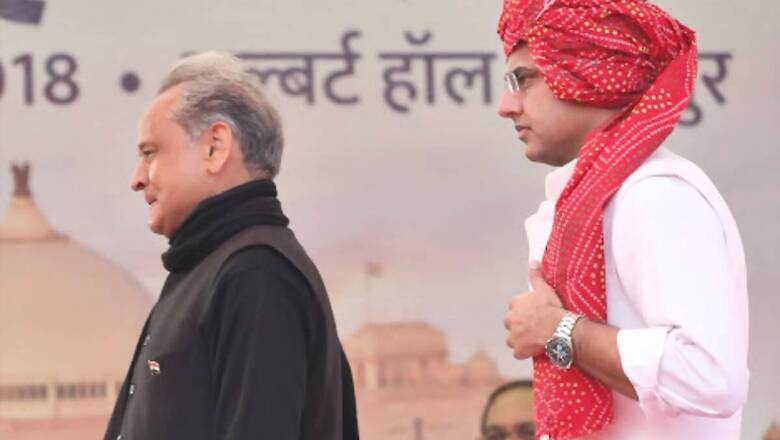
views
The Tenth Schedule of the Constitution, or the anti-defection law, is currently at the core of the political crisis in Rajasthan.
Sachin Pilot has legally challenged the disqualification notice issued to him and 18 other "rebel" Congress MLAs, claiming he cannot be said to have "voluntarily given up his membership" [para 2(1)(a) of the anti-defection law] just because he expressed dissenting opinions.
Pilot’s lawyers have actually challenged the constitutional validity of para 2(1)(a), arguing for it to be declared ultra vires (outside the scope of) the basic structure of the Constitution.
Under the Tenth Schedule, there are two ways a lawmaker could be disqualified -- if he/she voluntarily gives up his/her membership of their party [para 2(1)(a)], or if he or she "votes or abstains from voting in such House contrary to any direction issued by the political party", which is the [para 2(1)(b)].
Even as the crisis continues to intensify, the Congress chose to pull out for now from a legal battle in the apex court with Rajasthan Speaker CP Joshi withdrawing his petition against last week's high court order, asking him to defer action till July 24 on the disqualification notices to Pilot and the other rebel MLAs.
Meanwhile, it is the second clause that has become the centre of another politico-legal debate -- the one concerning the Bahujan Samaj Party (BSP) and its claim of having the authority to issue whip to its six MLAs.
Late on Sunday evening, BSP national general secretary Satish Mishra issued a whip on the party’s behalf asking six MLAs in Rajasthan to vote against the Ashok Gehlot government in the Assembly. Mishra said the MLAs -- Lakhan Singh, Deep Chand, R Gudha, Wajib Ali, JS Awana and Sandeep Kumar -- would be disqualified if they defied the whip.
The six MLAs had announced their merger with the Congress last September, almost a year after the Assembly elections were held in the state.
The Speaker had accepted the merger under the Tenth Schedule of the Constitution or the anti-defection law although it was subsequently challenged by the BSP in the office of the Election Commission of India. A decision is pending.
On Monday, a petition against the merger of BSP MLAs into Congress was moved before the Rajasthan High Court by BJP MLA Madan Dilawar, although it was dismissed later.
Meanwhile, Governor Kalraj Mishra told the Gehlot government on Monday that an Assembly session can be called at a short notice if the agenda is a floor test, a conditional acceptance of the Congress demand as the party that the President's intervention in the state’s political crisis.
So Was The Whip Legal?
Experts have different opinions on who actually has the legal authority to issue whip in the Assembly.
Many have argued that each party has to name its whip before the start of the Assembly. If, in the BSP’s case, that name is Mishra, then his whip could be considered legally tenable.
The counter-argument to this has been provided by Mishra himself. Speaking to ANI, he said, “The BSP is a national party, there cannot be any merger at the state level at the instance of the six MLAs, unless there is a merger of the BSP at the national level."
According to him, the leadership at the national level has to approve of the merger, the state unit cannot unilaterally take this decision.
But Sunil Fernandes, the lawyer representing the Congress, in his conversations with the media, has claimed it is the Tenth Schedule that allows the merger of a unit of a national party with another national party.
“The merger took place months ago. It is surprising why the BSP central leadership has woken up and realised the merger was illegal. BSP is making this plea only after a BJP MLA filed a petition in the HC to disqualify the BSP MLAs. The BSP and Dilawar are both wrong," said Fernandes.
“The Tenth Schedule permits merger of legislative party also. The contention that BSP as a national party must merge with the INC for the BSP MLAs to merge with INC is misconceived. The parent party may not merge but members of a legislative party have the right to merge with some other party under the X Schedule (Anti - Defection Act) of the Constitution," he said.
Besides, there is a precedent of merger of lawmakers of national parties merging with another national party – the merger of Congress MLAs in Goa into the BJP, for instance. There is also the case of two Telugu Desam Party MPs in Rajya Sabha joining hands with the BJP.
If two-thirds of the lawmakers of a party desert their parent political outfit to join or merge with another political outfit, they are deemed to have evaded disqualification under the Tenth Schedule.
It was in 1985 that the Rajiv Gandhi government brought a bill to amend the Constitution and curb defection and, as some constitutional experts have argued, to preserve the party structure.
The Tenth Schedule, which contains the anti-defection law, was added to the Constitution through this amendment.
The law was amended in 2003 under Atal Bihari Vajpayee-led NDA which deleted a provision under which a split in the party in which one-third of the legislators of that party forming a separate group, were not disqualified.




















Comments
0 comment